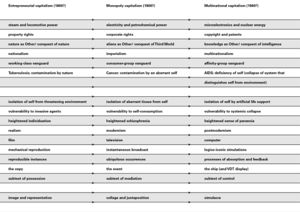User:Manetta/annotations-nicols the-work-of-culture-in-the-age-of-cybernetic-systems
The Work of Culture in the Age of Cubernetic Systems (1988) Bill Nichols
annotated at 17-02-2015
introduction
"Nichols discusses this shift [from the mechanical reproduction to a cybernetic experienced influence on society] in several ways, outlining how it represents a shift from a fetishization of the object to fetishization of the process of interaction, of simulation."
Examples of this are interactive experienced video games as Magic's Babyz, and The Sims. These simulations bend toward the "territory of ideology", and especially with the Sims, the users seem to be "pushed back against the ideology of the system".
"Nichols hopes in his essay to (...) transgress its predefined interdictions and limits".
main text
introduction
"The computer is more than an object: it is also an *icon* and a *metaphor* that suggests new ways of thinking about ourselves and our environment, new ways of constructing images of what it means to be human and to live in a humanoid world."
The computer symbolizes "the entire spectrum of networks, systems, and devices that exemplify cybernetic or 'automated but intelligent' behavior", just as the camera symbolized the 'photographic and cinematic processes'.
It includes the dilemma of ambivalence between the
- negative: "currently dominant, tendency toward control"
- positive: "more latent potential toward collectivity"
The essay will
- "contrast characteristics of cybernetic systems with those of mechanical reproduction
- "esthablish a central metaphor to understand these cybernetic systems"
- "ask how this metaphor acquires the force of the real" (how different institutions legitimate their practices, recalibrate their rationale, and modulate their image in light of this metaphor)
Mechanical Reproduction and Film Culture
Benjamin discusses three types of changes:
- art is a commodity
- art loses its aura, "by which Benjamin means its authenticity". And so the shift from the art work as having a cult value to a exhibition value (shift from basis in rituals to a basis in politics)
—> "Benjamin elaborates how political practice opens the way for a strange transformation of the actor. (…) Mechanical reproduction allows the actor an unlimited public rather than the delimited one of the stage or, for the politician, parliament."
- change in categories of perception :
—> "During long periods of history, the mode of human sense perception changes with humanity's entire mode of existence"
- As industrial capitalism nature is directly related to copies, that does not only contain visible objects, but also copies of humans (in the sense of their labor that is replaced by machines).
- "Montage has a liberating potential", towards political engagement and exhibiting an alternative perception of the real.
- film as a stimulation for curiousity, "we calmly and adventurously go traveling"
- Original or not is not the question anymore: with film this notion fades…
—> "Montage‐the connecting of dissimilars to shock an audience into insight ‐ becomes for Benjamin a major principle to artistic production in a technological age."[4]
- "New ways of seeing (…) is not *ideological* but *transformative*" —> linked to habits —> "They [ways of seeing] are not the habits of old ways but new; they are skills which are difficult to acquire precisely because they are in opposition to ideology." - Working class has access to techniques of production —> world as artificial arrangements (maakbare wereld) —> liberating form
- "We might then ask in what ways is our "sense of reality" being adjusted by new means of electronic computation and digital communication?"*
- "Have cybernetic systems brought about changes in our perception of the world that hold liberating potential?"*
cybernetic systems and electronic culture
"Simulacra introduce the key question of how the control of information moves towards control of sensory experience, interpretation, intelligence, and knowledge."
"the simulation as an imaginary Other which serves as the measure of our own identity"
- the measure of ourselves, the Others:
- early capitalism —> humans & animals
- monopoly capitalism —> human & machines
- post industrial capitalism —> human & cyborgs
- "The metaphor that's meant (that's taken as real) becomes the simulation. The simulation displaces any antecedent reality, any aura, any referent to history. Frames collapse."*
text (in-circuit)
"the concept of "text" itself undergoes substantial slippage":
- "de‐emphasizes authorship in favor of 'messages‐in‐circuit'" (which leads to —>)
- The text conveys the sense of being addressed to us.
—> "That which is most textual in nature ‐ the fixed, read‐only‐ memory (ROM), and software programs ‐ no longer addresses us. Such texts are machine addressable."
- "The temporal flow and once‐only quality of face‐to‐face encounter becomes embedded within a system"
the question of the 'real'
"If mechanical reproduction centers on the question of reproducibility and renders authenticity and the original problematic, cybernetic simulation renders experience, and the real itself, problematic."
"we encounter simulacra that represent a new form of social practice in their own right and *represent nothing*."
"The computer simulation suggests only a "being here" and "having come from nowhere" of what it presents"

